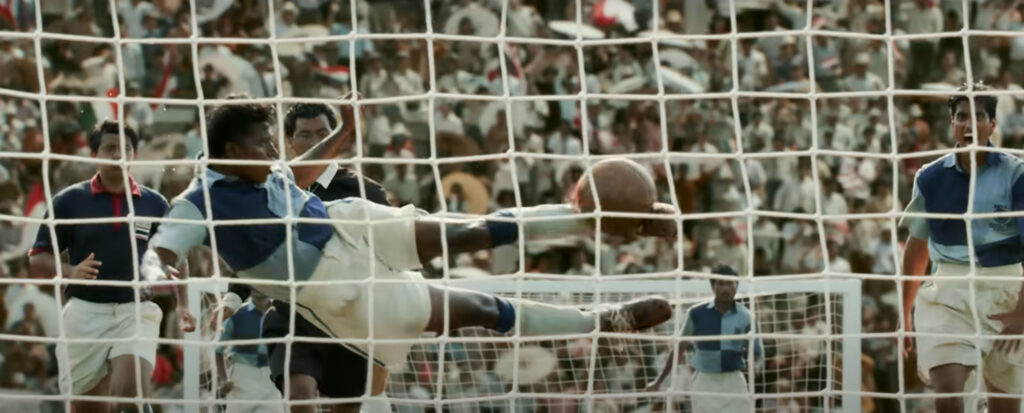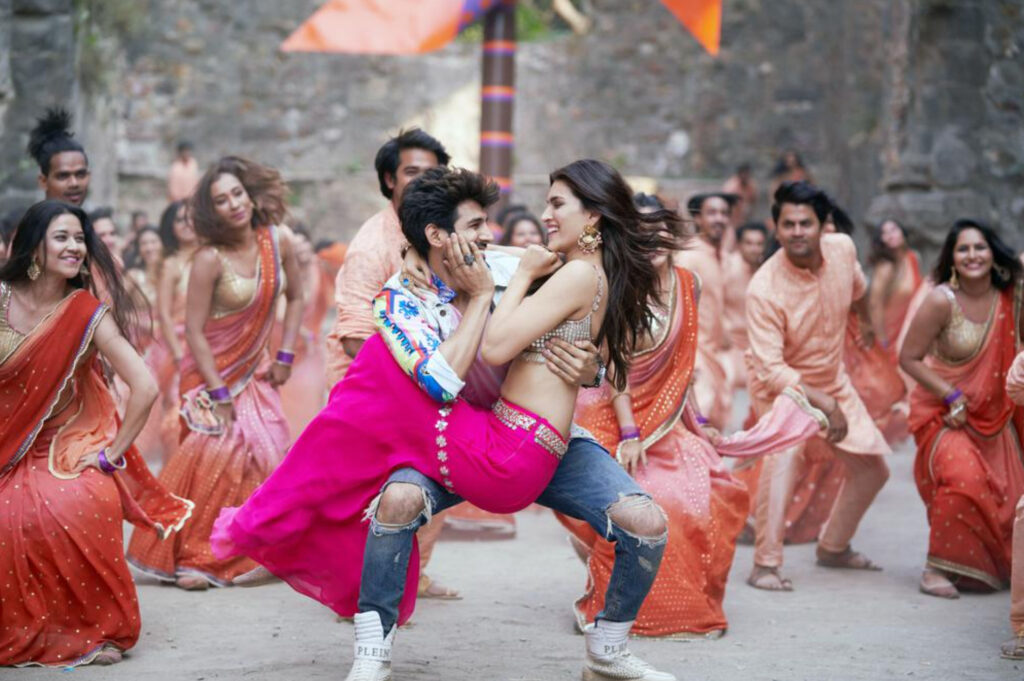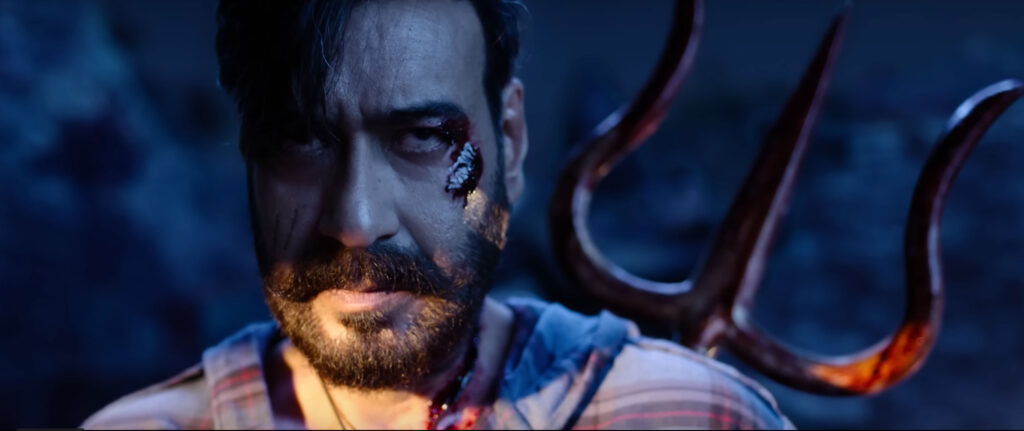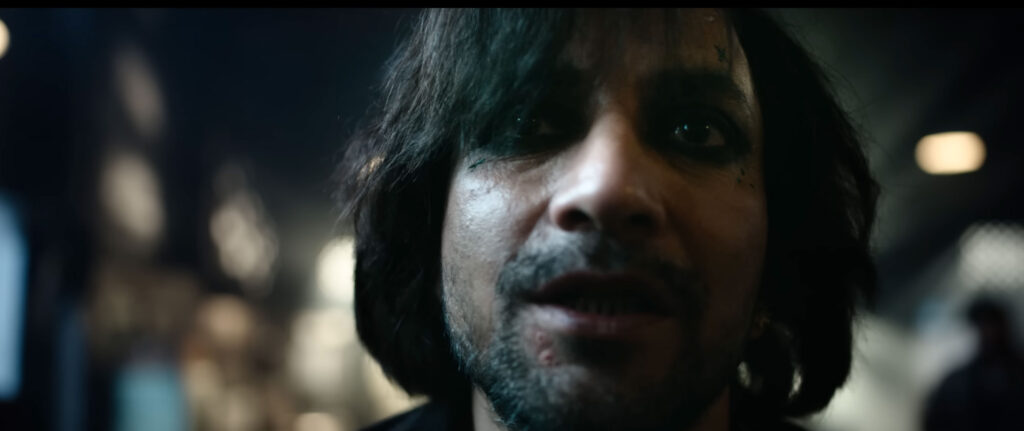April 12, 2024
by Carla Hay

Directed by Amit Sharma
Hindi with subtitles
Culture Representation: Taking place in India and other parts of the world, from 1952 to 1962, the dramatic film “Maidaan” features a predominantly Asian cast of characters (with some white people) representing the working-class, middle-class and wealthy.
Culture Clash: Against the odds, Syed Abdul Rahim, also known as Rahim Saab, takes India’s national soccer team, which was on a losing streak for years, to the Olympics and to the 1962 Asian Games.
Culture Audience: “Maidaan” will appeal primarily to people who are interested in sports biopics, movies about soccer, and stories about underestimated people who overcome challenges.

“Maidaan” did not need to be a three-hour movie, but this drama about soccer coach Syed Abdul Rahim, also known as Rahim Saab, is undoubtedly inspirational. The team players needed more character development, but the soccer matches are exhilarating. “Maidaan” is reliably predictable, mainly because what Rahim (played by Ajay Devgn), who was nicknamed S.A., achieved is already well-known to many people and is the type of subject matter that gets made into a movie like this one. However, “Maidaan” gives more insight into the behind-the-scenes challenges and the power struggles within the All India Football Federation that affected Rahim’s in his life and his quest to turn India’s national soccer team in to a world-class championship team.
Directed by Amit Sharma, “Maidaan” (which means “field” in Hindi) was co-written by Sharma, Saiwyn Quadras, Aman Rai and Atul Shahi. The movie takes place in chronological order, from 1952 to 1962, during which Rahim had a transformative reign as the head coach of India’s national soccer team. As “Maidaan” shows, it was a turbulent experience where Rahim got resistance at various times from certain members of the All India Football Federation board of directors, which votes for who will be the head coach.
“Maidaan” opens in 1952, with a scene that was unfortunately all too common for India’s national soccer team: The team loses a match. In this case’s India was playing against Yugoslavia’s national soccer team and lost in a humiliating 10-1 final score.
Rahim is shown in a conference room meeting with members of the All India Football Federation. At this point in his career, Rahim had been a teacher (with a college degree in arts), a professional soccer player, and a coach for soccer teams in his birthplace/hometown of Hyderabad, India. Rahim tells the assembled federation committee members that India’s national team has been on a losing streak for three main reasons:
- The team members play in bare feet.
- India’s domestic matches are 70 minutes each, while international teams have 90-minute matches.
- Too much belief in old team stars who need to retire.
Rahim confidentially tells the federation committee that if they elect him to be the head coach of India’s national soccer team, he can help the team achieve something that the team had not achieved since it began doing international tours in 1924: Win a championship. Although there are some skeptics on the committee, Rahim gets enough votes to become the head coach. Rahim doesn’t promise quick success with this goal, but he is sure he can achieve this goal if he find the right team players. (In real life, Rahm became the head coach of India’s national team in 1950, not 1952.)
“Maidaan” then has the expected montage of Rahim traveling to various places in India (such as Calcutta, Punjab, Bombay and Kerala) to find the players who will be on his “dream team.” They include forward Tulsidas Balaram (played by Sushant Waydande); striker PK Banerjee (played by Chaitanya Sharma), who was the team’s captain for a period of time; goalkeeper Peter Thangaraj (played by Tejas Ravishankar); striker Neville D’Souza (played by Aryann Bhowmik); and striker Chuni Goswami (played by Amartya Ray). The casting for “Maidaan” is very admirable, since all of the actors portraying the star team members resemble the real-life people and are convincing as professional athletes. (For the purposes of this review, the characters in the movie are referred to by their first names.)
One of the first things that Rahim does that’s a revolution in Indian soccer is that he requires the team members to wear shoes, which obviously reduces cuts and bruises to the team members’ feet. “Maidaan” does a pretty good job of showing how this wasn’t an easy adjustment for most players, who were accustomed to being barefoot while playing the game. Getting shoes for the team members was also fraught with financial issues, because India’s cash-strapped national soccer team couldn’t afford large expenditures. n the early years, they often had to use previously owned or donated shoes.
The players themselves also needed a lot training in other areas. “Maidaan” shows that there was a lot of raw talent that Rahim had to hone into finely tuned and disciplined athleticism. When Rahim first meets Tulsidas, Rahim says that Tulsidas is talented but needs more stamina. PK is heartthrob with a large female fan base, so Rahim tells him not to get distracted by dating fans. Chuni is kind of a prima donna, so Rahim has to train Chuni to be more of a team player.
Meanwhile, during Rahim’s career that is depicted in the movie, he has two main adversaries: a powerful All India Football Federation board member Shubhankar (played by Rudranil Ghosh) and influential sports journalist Roy Chaudhary (played by Gajraj Rao), who were early and very vocal skeptics of Rahim. Because of their initial skepticism, Shubhankar and Roy want to be proven they were right, so they want to see Rahim fail, even if it means that India’s national soccer team will fail too. Various scheming ensues between these two manipulative haters.
As for Rahim’s personal life, it’s a secondary part of the story. He has a stereotypically loyal and loving wife at home named Saira (played by Priyamani), who is supportive of Rahim, even though she knows that his job requires him to frequently be away from home. Rahim and Saira have two children: son Hakim and daughter Seerat. In the beginning of the movie, Hakim (played by Devyansh Tapuriah) is about 9 years old, while Seerat (played by Nitashi Goel) is about 5 years old. Hakim as a teenager and young adult is played by Rishabh Joshi.
Rahim is obviously a workaholic, but the toll that it takes on his marriage seems a little too glossed over in the movie. Rahim’s frequent absences from home and obsession with soccer have caused him to have a somewhat distant relationship with Hakim, who desperately craves Rahim’s attention. It should come as no surprise that Hakim decides to become a player on India’s national soccer while still being an engineering student at a university.
Rahim took the team to the Asia Games and the Olympics more than once. The outcomes of these experiences won’t be revealed in this review. However, it’s enough to say that a big part of these experiences was how Rahim and the team dealt with racism and xenophobia. Rahim becomes under increasing pressure when a championship title becomes more elusive than he imagined. And, since this is a sports movie, there are the expected injuries that happen during crucial moments in or before a match.
Devgn gives an impressive (but not award-worthy) performance as Rahim, who is not presented as flawless or “too good to be true.” Rahim can be stubborn, impatient and arrogant. However, Rahim is also an empathetic and motivational leader who inspires his team instead of intimidating them.
The supporting cast members also do fine jobs in their roles, although Shubhankar is written as bit of a two-dimensional villain. Considering the movie’s three-hour runtime, there could have been more shown in the movie about the individual players. The most that viewers will see about the indivdual players’ personal lives is when PK tells Rahim that PK is distracted during a practice session because PK’s father has lung cancer. If you know what happened in real life to Rahim (a heavy smoker), then you will already know that Rahim will have his own health crisis in this story.
“Maidaan” has moments when the movie’s pacing drags. However, viewers who have the patience to keep watching will be rewarded in the movie’s final hour, which is the best part of the film. The 1962 Asian Games depicted in the movie have some adrenaline-charged, immersive scenes that will make viewers feel like they’re experiencing the matches right along with the players. A.R. Rahman’s stirring musical score also adeptly heightens the moods in each scene. “Maidaan” is not a groundbreaking sports movie, but it’s competently made, and it delivers exactly what it’s supposed to deliver in crowd-pleasing entertainment.
Zee Studios released “Maidaan” in U.S. cinemas and in India on April 10, 2024.




